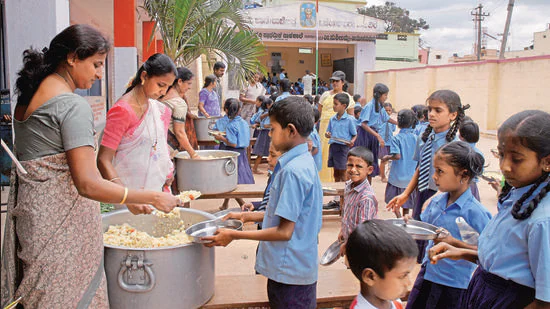SYLLABUS
GS-2: Welfare schemes for vulnerable sections of the population by the Centre and States and the performance of these schemes; mechanisms, laws, institutions and Bodies constituted for the protection and betterment of these vulnerable sections.
Context: Recently, the Ministry of Education received formal proposals from several States and UTs asking to expand the PM-POSHAN scheme to include a morning meal for school students.
More on the News
• Seven States and UTs have requested the Centre to add breakfast to the PM-POSHAN scheme in line with the National Education Policy (NEP) 2020 recommendations.
- Eleven States and UTs, including Kerala, Karnataka, and Meghalaya, have also sought the extension of PM-POSHAN to students up to Class 12.
• The request follows the NEP 2020’s call for a nutritious breakfast before classes to enhance students’ concentration and academic performance.
• The Ministry is currently evaluating the feasibility and financial implications of the proposal, with the estimated additional cost being around ₹6,000 crore annually.
• A final decision will depend on inter-ministerial consultations and budgetary provisions, with a possible pilot rollout before full-scale implementation.
Key Details of the Proposal
• The PM-POSHAN (Prime Minister’s Overarching Scheme for Holistic Nourishment) scheme, earlier known as the Midday Meal Scheme, provides cooked meals to students from pre-primary to Class 8 in government and government-aided schools.
• The Centre supplies foodgrains and shares the cost with States in a 60:40 ratio, and in a 90:10 ratio for northeastern and Himalayan States.
• States such as Tamil Nadu, Gujarat, and Telangana have already introduced state-funded breakfast schemes showing positive results in attendance and classroom engagement.
• The Ministry of Finance earlier declined the breakfast proposal in 2021, citing fiscal constraints, but the demand has gained renewed support after its success in some States.
• The Education Ministry is likely to seek Cabinet approval after reviewing State feedback and assessing cost-sharing models.
POSHAN Abhiyaan
• The Government launched the POSHAN Abhiyaan (National Nutrition Mission) on March 8, 2018, to address malnutrition among children, adolescent girls, pregnant women, and lactating mothers.
• The programme aims to reduce stunting, undernutrition, anaemia, and low birth weight in a time-bound manner through a life-cycle approach.
• The targets include reducing stunting and undernutrition by 2% per annum and anaemia among women and children by 3% per annum.
Mission POSHAN 2.0
• It was announced in the 2021–22 Budget, as an integrated nutrition support programme covering all States and Union Territories.
• The mission aims to strengthen nutritional content, delivery, and governance through the Poshan Tracker and accredited food testing laboratories.
• States and UTs are encouraged to promote AYUSH-based practices for malnutrition prevention and to establish Poshan Vatikas at Anganwadi Centres to enhance dietary diversity.
• Guidelines have been issued to ensure transparency and accountability in supplementary nutrition delivery and to track outcomes effectively.
UPSC Mains Practice Question
Q: Discuss the significance of expanding the PM-POSHAN scheme to include breakfast in light of the National Education Policy (NEP) 2020. How can this initiative contribute to improving learning outcomes and addressing child nutrition challenges in India?

